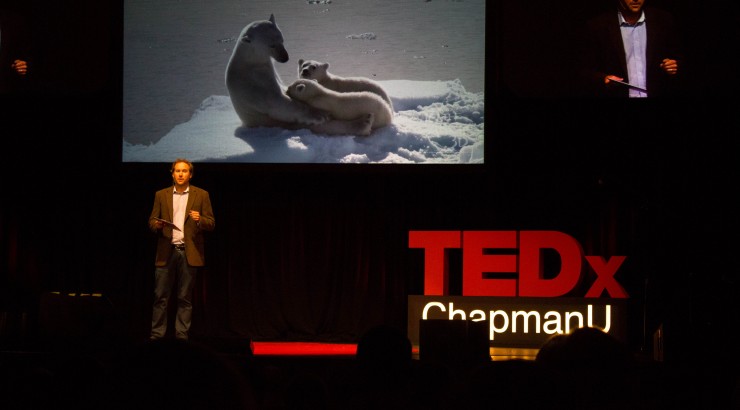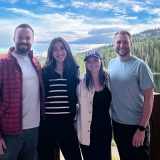Icons, Geniuses and Mavericks: Chapman University’s TEDx Conference
June 25, 2012
TED has been around for close to thirty years now. Their belief is their creed: “Ideas worth spreading.” I first encountered the web-based TED Talks as an undergraduate. Jill Bolte Taylor was describing what it’s like to have a stroke and I found myself crying, watching this woman open herself up to the world. It was an incredibly moving video (which I suggest everyone watch) and I was immediately sold on this notion that ideas are, indeed, worth spreading.
More than four years later, I found myself sitting in Chapman University’s Memorial Hall for the first ever TedxChapmanU (the “x” stands for independent if you didn’t know). Over the years, I’ve watched dozens of Talks and will stream them from Netflix when I’m ironing or listen to them on my daily commute to LA, but I’ve never been able to attend an actual event. Needless to say, my excitement was boiling over for the days leading up the Chapman’s conference.
The theme of Chapman’s TED event was: Icons, Genius & Mavericks. The whole event lasted more than four hours, and I found myself engaged the whole time. I learned that the quicker we embrace failure, the sooner you find success. I learned about the kind of people Steve Jobs gravitated towards from the man who created Apple’s “Think different” campaign and their famous 1984 Super Bowl ad. I learned about one woman’s emotional journey to stretch a dollar as far as economically possible in the world’s poorest countries. As I reflect on the dozen or so 20-minute speeches I watched last night, there were many that specifically stood out, but a few that are worth mentioning outright.
1) If you ever saw the movie Freedom Writers then you are already familiar with Erin Gruwell’s work with inner-city students and how she inspired them to stand up to a life of poverty, violence, and societal debasement. Her talk covered a lot of that story,
but it proved to also be a motivation to improve our world, and it showed how simply some people are doing it. Erin, for example, merely encouraged her students to write their stories down. They were following in the footsteps of Anne Frank and countless
other oppressed who put pen to paper, if for nothing else than to ensure the world remembered what they experienced. Quote to remember:
“Evil prevails when good people do nothing.”
2) Producer/director Shaun MacGillivray has been making movies for decades. His father, Greg, is an Academy Award-nominated filmmaker and directed IMAX’s first film during the 70’s. Because of his father, Shaun was introduced to a wide range of environments and exotic locations. At TED, Shaun shared a bit of his background but mostly focused on finding stories in everything. Shooting multiple IMAX films, Shaun expressed his belief that life has a story if we want to hear it. Quote to remember:
“It’s hard to protect and care for what you can’t understand. Stories can cross that divide.”
3) While I’ve highlighted two speakers who concentrated on “story,” and I realize that this blog is an extension of Dodge College, I must say the most inspiring talk of the day had to go to a last-minute addition. Yossi Hollander taught me how to end this country’s “oil addiction” and altered some goals in my life as well. In the vein of An Inconvenient Truth, much of Yossie’s powerful rhetoric derived from a string of facts that made the entire audience sit up and take notice. In summary: We have a petroleum addiction that is slowly crippling our planet. And yet, all is not lost. Yossie provided us with relatively simple and cost-effective solutions for alternative liquid fuels that would cost about $2/gallon. The catch? We need federal regulations to change and gas stations must loosen their collective bargaining and licensing agreements to allow for fuels such as: ethanol, methanol, natural gas and electricity. Sounds easy, right? I wish I could do the talk justice. You’ll just have to check it out for yourself when the link becomes available. If just this much has piqued your interest, you can learn more and figure out how you can help on their website. Quote to remember:
“At $200/barrel, we might have enough oil for 1,000 years.”
In an earlier entry I posted this past Spring, I mentioned that advice you hear during speeches and commencement speakers often are merely regurgitations of the same thoughts: be a person for change, remember the little people, nothing worth doing comes easy, be passionate, and so on. TED is an exceptional platform for speakers to stand out from the crowd (Bill Gates releasing mosquitoes into the audience during his talk), to highlight controversial issues (Chapman professor Dr. Frank Frisch’s “Say Yes to Steroids”), to truly inspire (Sir Ken Robinson’s “Do schools kill creativity?”), to boggle the mind (David Christian’s “Big History”), or to make us laugh at our world (Rob Reid’s “8 Million Dollar iPod”). Each TED experience is unique. Expect to hear and see things you haven’t seen or heard or thought about before. Expect to be amazed, inspired, humored, saddened and scared. Expect to feel insignificant but driven to become something significant.
Reflecting on the day’s events, I must say how proud I was to be a Chapman student — to be a part of a university that cares enough to bring important issues to the Orange County area. The best part though? Every one of the people who spoke at TEDxChapmanU lives within an hour of Orange These innovators, these geniuses, icons and mavericks, these extremely humble and humane human beings live here with us. It made me think of a rare interview with Steve Jobs where he explains “The Secret of Life.” Steve’s pearl is, “Everything around you that you call “life” was made up by people that were no smarter than you.”
I can’t wait to see what the speaker line-up will be next year. This is a tradition well worth continuing here at Chapman, and it will only set us farther apart as a university.


